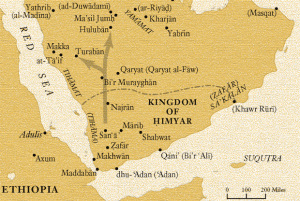The Jewish Wives of Muhammad

A map of the Arabian Peninsula showing the Jewish-Arab Kingdom of Himyar, together with other notable Jewish villages
Rayhana bat Zayd (c. 600-631 CE) was a woman of the Arab-Jewish tribe of Banu Nadir which inhabited the Arabian Peninsula before the advent of Islam. At a young age, she married a man from the neighbouring Arab-Jewish tribe of Banu Qurayza. By 627 CE, Muhammad was taking over the Arabian Peninsula and invaded the Banu Qurayza territory. What followed is known as the “Massacre of Banu Qurayza”, where every Jewish male was slaughtered, and every woman and child enslaved. The beautiful women among the slaves were taken as wives by Muhammad’s men. Rayhana caught the eye of Muhammad himself, who wished to have her as his own wife. However, Rayhana refused time and again to convert to Islam, preferring to remain a slave. At the end, Muhammad married her anyway. Her refusal to wear a hijab brought further tension to their marriage. Some say she reverted to being a slave and died shortly after, while others say Muhammad freed her and she went back to live among the Jewish tribes.
Rayhana’s compatriot, Tsofiya bat Chai (c. 610-670), was born to the rabbi and chief of the Banu Nadir tribe. In 629 CE, Muhammad’s armies defeated the Jewish tribes at Khaybar, once again slaughtering much of the village, including Tsofiya’s husband. Tsofiya was enslaved, then given to a Muslim warrior. After spotting her, Muhammad wanted Tsofiya, too, for himself, and traded seven other woman for her. He freed her from slavery and she converted to Islam under duress. She went on to become among the greatest of Muhammad’s wives, and highly influential in the history of early Islam, where she is known as Safiyya bint Huyayy, and is considered one of the Umm-ul-Mo’mineen, or “Mothers” of Islam. When Muhammad’s other wives teased Safiyya for being Jewish, Muhammad instructed her to remind them that “your father was the prophet Aaron, and your uncle the prophet Moses” and to tell them: “Therefore, I am superior to you.” Safiyya never bore any children for Muhammad, and at her death, she left her estate of 100,000 dirhams to her Jewish nephew. Both Safiyya and Rayhana were buried in the Al-Baqi cemetery in Medina (part of today’s Saudi Arabia), where Muhammad was also buried.
Words of the Week
The Jews are like everybody else, only more so.
– Heinrich Heine


